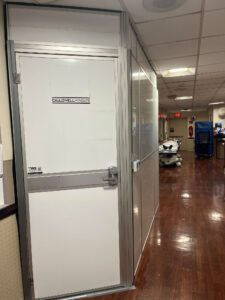ICRA 2.0 Changes: What Healthcare Facilities Need to Know
Healthcare facilities face mounting pressure to maintain safe environments while adapting to evolving regulations. The updated Infection Control Risk Assessment (ICRA) 2.0 guidelines introduce significant changes that directly impact how healthcare institutions approach construction and renovation projects. Understanding these updates ensures your facility remains compliant while protecting patients and staff from airborne contaminants.
ICRA 2.0 represents a comprehensive revision of infection control standards, requiring healthcare facilities to reassess their current protocols and implement enhanced protective measures during construction activities.
Understanding ICRA 2.0 Updates
The American Society for Healthcare Engineering (ASHE) developed ICRA 2.0 to address gaps in previous infection control protocols. These updated guidelines provide more detailed requirements for risk assessment procedures and containment strategies.
ICRA 2.0 expands the classification system for construction activities, introducing more granular categories that better reflect the actual risk levels associated with different types of work. The updated framework requires facilities to conduct more thorough assessments before beginning any construction or renovation project.
Key Changes in ICRA 2.0
The most significant change involves the risk classification matrix. ICRA 2.0 introduces a more detailed scoring system that considers multiple factors, including patient population vulnerability, construction activity type, and duration of work.
Enhanced documentation requirements now mandate detailed written assessments for all construction activities. Facilities must maintain comprehensive records of risk evaluations, mitigation strategies, and monitoring results throughout project duration.
The updated guidelines also establish stricter air quality monitoring protocols. Facilities must implement continuous monitoring systems during construction activities and maintain detailed logs of air quality measurements.
Containment requirements have become more stringent under ICRA 2.0. The guidelines specify minimum barrier standards for different risk categories, requiring more robust containment systems for higher-risk activities.
Impact on Healthcare Institutions
Healthcare facilities must now allocate additional resources for compliance activities. The enhanced documentation requirements and monitoring protocols require dedicated staff time and specialized equipment.
Budget implications extend beyond immediate compliance costs. Facilities may need to invest in upgraded containment systems, air monitoring equipment, and staff training programs to meet the new standards.
Project timelines may extend due to more comprehensive planning requirements. The detailed risk assessment process and enhanced containment protocols can add weeks to project schedules, particularly for complex renovations.
Staff training becomes critical under ICRA 2.0. Healthcare facilities must ensure their teams understand the updated protocols and can properly implement the required containment measures.
Benefits of Temporary Wall Systems for ICRA 2.0 Compliance
Temporary wall systems provide an effective solution for meeting ICRA 2.0 containment requirements. These modular barriers create sealed environments that prevent airborne contaminants from spreading to patient care areas.
Our temporary wall systems offer several advantages for ICRA 2.0 compliance:
- Complete containment: Modular walls with integrated doors create fully enclosed construction zones that meet stringent barrier requirements
- Flexible configuration: Systems adapt to various project sizes and building layouts, ensuring optimal containment regardless of construction scope
- Professional installation: Our turn-key service includes delivery, installation, and removal, eliminating the burden on your facility staff
- Pressure control: Walls accommodate negative pressure systems required for high-risk construction activities
The reusable nature of temporary wall systems provides cost-effective compliance solutions. Rather than constructing permanent barriers for each project, facilities can rent modular systems that meet ICRA 2.0 standards while reducing overall project costs.
Implementing Effective Compliance Strategies
Healthcare facilities should begin ICRA 2.0 preparation by reviewing current infection control protocols and identifying areas requiring updates. This assessment should include evaluation of existing containment resources and staff training needs.
Establishing partnerships with qualified temporary wall system providers ensures access to compliant containment solutions when construction projects arise. Pre-planning these relationships reduces project delays and ensures immediate access to necessary equipment.
Documentation systems require careful attention under ICRA 2.0. Facilities should implement robust record-keeping procedures that capture all required assessment data and monitoring results.
Ensuring Seamless Project Execution
ICRA 2.0 compliance requires careful coordination between infection control teams, construction managers, and containment system providers. Temporary Wall Systems delivers comprehensive support throughout this process, from initial planning through project completion.
Our experienced team understands healthcare facility requirements and ICRA 2.0 protocols. We work directly with your infection control staff to design containment solutions that meet regulatory standards while minimizing disruption to patient care operations.
With our full-service approach, you can focus on core healthcare delivery while we handle containment system logistics. From delivery and installation to monitoring and removal, our turn-key service ensures ICRA 2.0 compliance without adding burden to your facility staff.
Contact Temporary Wall Systems today to discuss how our modular containment solutions can support your ICRA 2.0 compliance requirements and keep your next construction project on schedule.


